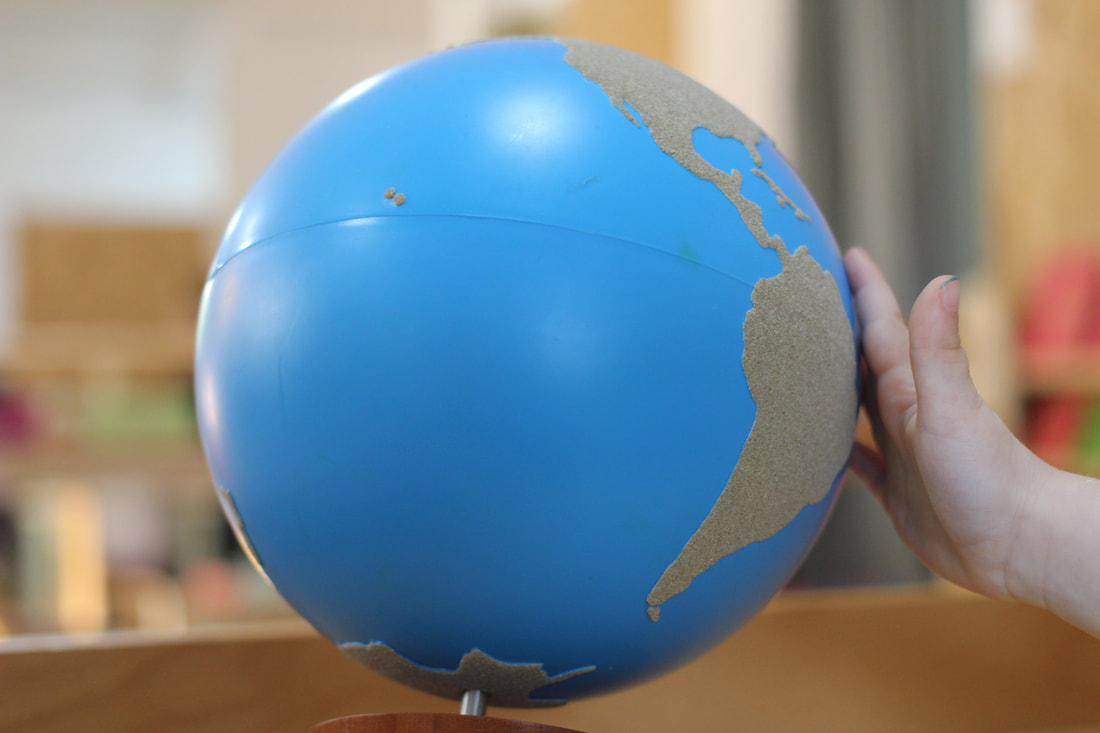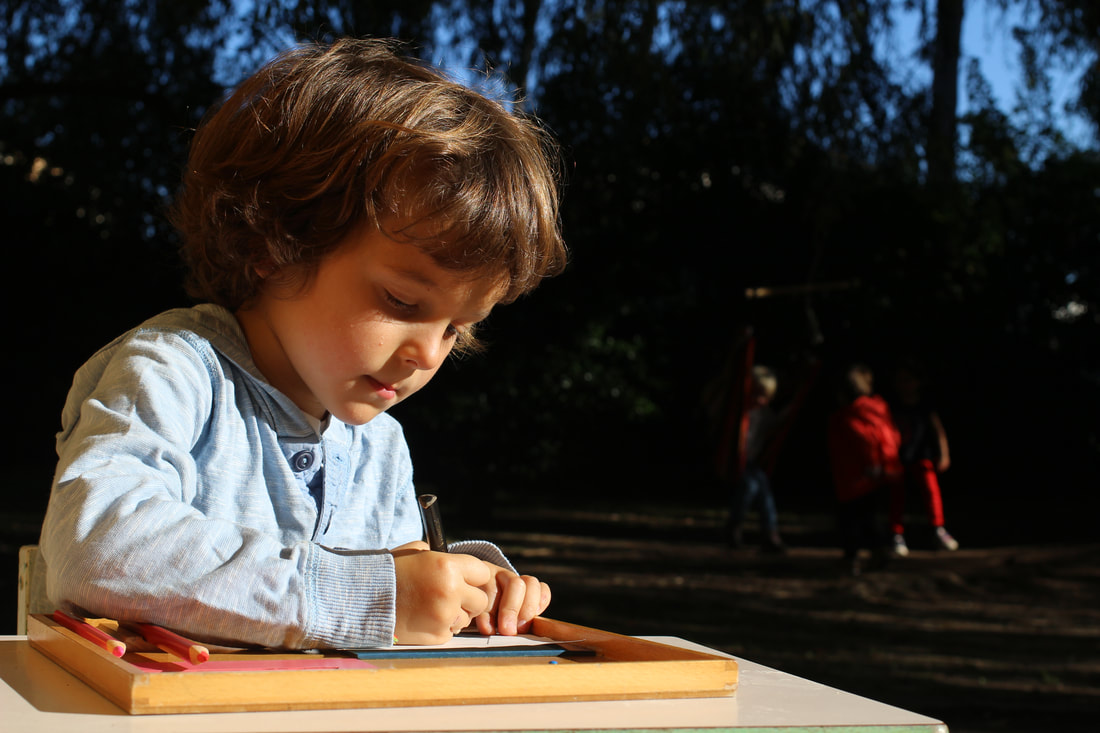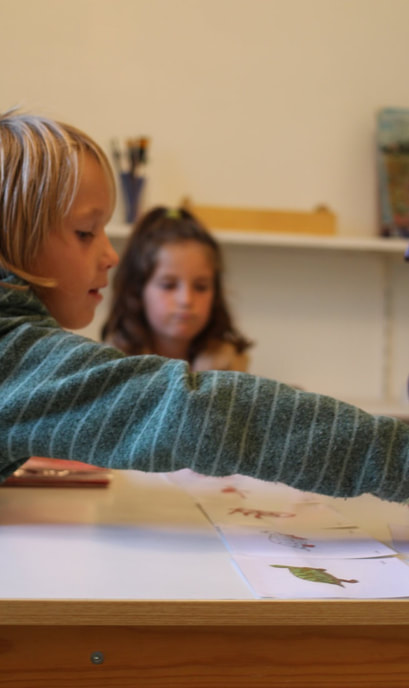Our Vision of LanguageMontessori Hossegor believes strongly that a second-language is enrichment to life, gifting children with life-long benefits.
And Dr. Montessori was right, because especially nowadays, if one becomes adapted only to one nation, one is not adapted to the world of our times. |
Peace and Education through Language
As monolingual children grow the more native words s/he gathers and the more effortlessly does s/he perfect the oration of his native tongue leaving behind the ability to orate language that do not originate within his community. The bilingual child unlike the monolingual adult is able to store the words of a foreign language into his/her word bank. As this word bank is built up, the child develops preconceptions of how a language is spoken, that is, how a language ought to sound. When we try to learn a foreign language as adults we can understand the difficulty in learning the language. These difficulties arise out of the preconceptions that we have built up during our many years of speaking our native language. The preconceptions surface because we have preconceived notions of how a language is suppose to sound and that language is our own native language. When we speak French we do so with an English accent. Preconceptions can suppress cultural understandings and acceptance. Take for example the subjunctive mood, used frequently in French but it is much less common in English. This is a tense that expresses emotion but that does not mean that emotion is not expressed in the English language. Learning another language is the doorway to understanding another culture and when we learn another culture we can truly comprehend the way in which another human being experiences and expresses life. With these tools children are better equipped to live in a more peaceful society adhering to Dr. Montessori’s vision of peace.
The Natural Process of learning a language
The first step of language acquisition is to acquire passive language skills; here the child is able to understand English. Gradually children gain productive language skills, where they are able to fluently speak English. Children are never forced to speak English adhering to the integrity of Dr. Maria Montessori’s vision for classroom environments.
The Children's HouseYoung children have an Absorbent Mind and can effortlessly absorb a second language as naturally as their first.
|
The Elementary YearsChildren enrolled in the Montessori Hossegor elementary program receive the Montessori elementary curriculum based on Cosmic Education and along the way achieve the benchmarks put forth by the National Education of France. Children will learn to understand speak, read, and write in English in addition to French.
|
How to support language development?
We very strongly encourage parents to take an active role in helping support and enrich their children’s French skills (or of the language you are speaking at home).
For children under five years of age the focus is to offer a verbal rich home environment.
-Young children have the Absorbent Mind, a mind that absorbs indiscriminately therefore it is beneficial if the parent utilizes a well-spoken French at home.
-Use a variety of language.
-Offer similes, analogies, and synonyms or different manners of expression.
-Use simple words but also infuse the home life with more complex words (i.e. ‘I am optimistic that today will be a marvelous day.’ rather than ‘I think today will be fun.’)
-Name the vocabulary during home activities or during excursions
-Use full sentences and more complex sentences as your child matures
-Read with your child in French daily
For children over five years of age
Raising a bilingual child can be a challenging road but a worthwhile and joyous journey. We encourage our families to read up on bilingual education. Our recommendation when selecting French books for children under six is to avoid books that contain anthropomorphism (i.e. a talking dog) and to select books that have morally sound messages, a rich vocabulary, or those that you the parent find interesting.
For children under five years of age the focus is to offer a verbal rich home environment.
-Young children have the Absorbent Mind, a mind that absorbs indiscriminately therefore it is beneficial if the parent utilizes a well-spoken French at home.
-Use a variety of language.
-Offer similes, analogies, and synonyms or different manners of expression.
-Use simple words but also infuse the home life with more complex words (i.e. ‘I am optimistic that today will be a marvelous day.’ rather than ‘I think today will be fun.’)
-Name the vocabulary during home activities or during excursions
-Use full sentences and more complex sentences as your child matures
-Read with your child in French daily
For children over five years of age
- Continue to read with your child. Your child can also read to you. Talk about what you read.
- Encourage your child to write in French. Find inventive ways to encourage children to write, for example children can write shopping lists.
Raising a bilingual child can be a challenging road but a worthwhile and joyous journey. We encourage our families to read up on bilingual education. Our recommendation when selecting French books for children under six is to avoid books that contain anthropomorphism (i.e. a talking dog) and to select books that have morally sound messages, a rich vocabulary, or those that you the parent find interesting.



